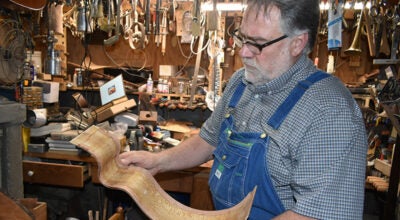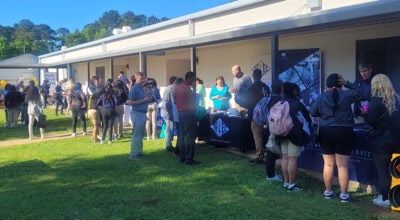Inside the Archives
Published 2:14 pm Monday, January 22, 2018
“Go back to the simple life; be contented with simple food, simple pleasures, simple clothes. Work hard, pray hard, play hard.” While those statements sound like New Year’s resolutions, they are Herbert Hoover’s charge to Americans in 1917 and 1918.
Two small cards, yellowed by time and brittle with age, on display at Cobb Memorial Archives’ “Defenders of Democracy: The Valley in World War I” exhibit bear Hoover’s gospel of simplicity, conservation, and contentment.
Food conservation became an aspect of daily life for Americans at home during World War I. With trench lines cutting across France and intense German submarine warfare disrupting shipping, the Allies suffered from food shortages. When American troops entered the war in April 1917, the government recognized the Herculean task of feeding their army overseas as well as the Allies’ dire need for food. The Food Administration emerged in August 1917 to manage the American food supply, encourage responsible use and conservation, and distribute foodstuffs.
A European food crisis created a new leader lauded as the Great Humanitarian: Herbert Hoover. A millionaire mining engineer and future president, Hoover earned international respect when he created the Commission for Relief in Belgium to alleviate the suffering brought on by war. In 1914 when the German army stormed through Belgium and left behind an occupying force, the small nation’s normal shipping channels were cut off.
Belgium, which had previously imported three quarters of its food supply, faced a perilous future. Hoover’s ingenious procurement and distribution of food saved millions of Belgians from starvation. In 1917, Hoover became the director of the Food Administration and applied the skills he learned from Belgian relief to the United States.
“Hooverize” entered the American vernacular to mean “to be saving or sparing in the use of food.” A schedule published in the LaFayette Sun on February 6, 1918 set aside Mondays and Wednesdays as “Wheatless Days” Tuesdays as “Meatless Days” and further asked that one meal every day be wheatless and meatless.
Charles Moon, a LaFayette attorney, served as the county’s Food Administration agent. Persuading and enforcing local compliance fell to him. Concerning the food restrictions he wrote in a LaFayette Sun article, “it is not a sacrifice. There are many foods that take the place of those we are required to forego.“
That same issue of the newspaper featured a novel bread recipe from Selma – soybean bread made with only water, salt, and soybeans. Simple to whip up, the article pronounced the finished product as being a rich bread whose “taste is very fine.”
Americans were encouraged to reinvent their menus using products such as ground corn or oats instead of wheat flour, reducing consumption of meat, and emphasizing fruits and vegetables since fresh produce would rot before reaching Europe. An enlarged photograph of the Riverview War Service Station is featured in the exhibit because of the poster hanging on its wall. “Corn the food of the nation” appears above a woman measuring out an ingredient. She is flanked by cornmeal, grits, and hominy on the left and tumbling stack of corn muffins and corn pancakes to the right.
American housewives received help in adapting their menus to meet the war time expectations. A new home demonstration agent, Miss Zelma Gaines, began working in Chambers County in February 1918 to instruct homemakers “in all things appertaining to the food problems of the home.”
Every citizen of Chambers County and West Point who lived during the first half of the 20th century “Hooverized.” George S. Cobb Jr., the son of the area’s Coca-Coca bottling plant operator, kept a scrapbook beginning in 1918. Although only eleven years old at the time, he clipped newspaper articles about world events. A neatly clipped photograph of Herbert Hoover pasted beside a printed message about food conservation titled “Save” indicate how effectively the Food Administration reached the American public with its message.
“Food will win the war” became the Food Administration’s war cry. Citizens around the country and here in Chambers County responded to the call.
To see the items mentioned above, Hooverizing cards, photograph of the Riverview War Service Station, and George S. Cobb Jr.’s scrapbook, please visit “Defenders of Democracy: The Valley in World War I” currently on display at Bradshaw Library. To learn more about Cobb Memorial Archives and local history, please call the archives at (334) 768-2050 or email robinbrown@chamberscountylibrary.org. Follow the archives on Facebook at https://www.facebook.com/cobbmemorialarchives/ and visit our blog at https://cobbmemorialarchives.wordpress.com/.



